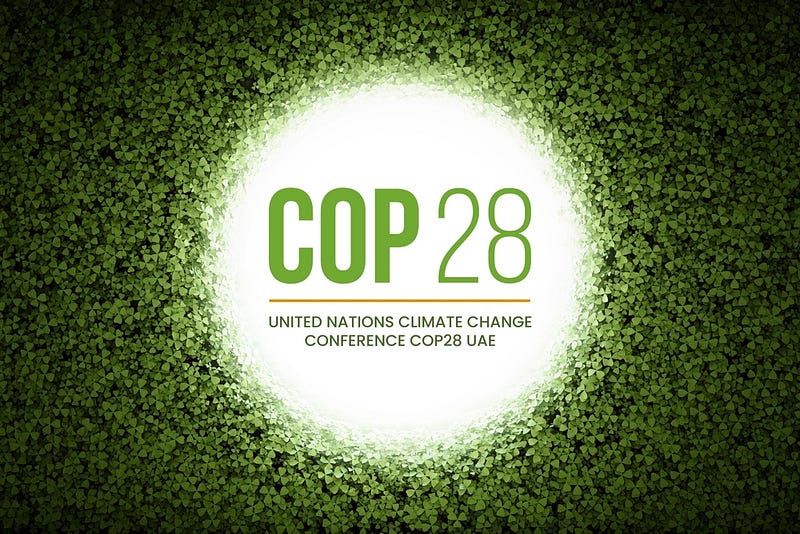Navigating COP 28: A Mix of Frustration, Doubt, and a Glimmer of Hope
Written on
Chapter 1: Setting the Stage for COP 28
As we approach COP 28, the forthcoming United Nations climate change conference, the prevailing sentiment is a complex blend of frustration, skepticism, and a slight flicker of cautious optimism.
"When the Rio Earth Summit concluded three decades ago, many in environmental circles, including myself, viewed it as a pivotal moment. The agreements forged then were expected to serve as blueprints for future progress."
However, even at that time, we held ambivalent feelings regarding the outcomes. While we felt a sense of validation seeing environmental issues rise to prominence within the UN's agenda, we were also disappointed by the lack of ambitious commitments from participating nations.
The Rio Summit truly set the stage for what followed, resulting in initiatives like the Kyoto Protocol and the Paris Agreement. These efforts have yielded a mix of modest achievements overshadowed by considerable delays.
Section 1.1: The Framework of Annual COP Meetings
The Rio Summit birthed the UN Framework Convention on Climate Change (UNFCCC), and since then, annual conferences have been held for its signatories to evaluate progress and strategize next steps.
The upcoming 28th Conference of the Parties (COP28) will take place in Dubai, United Arab Emirates, with representatives from 197 nations in attendance. Organizers anticipate over 70,000 participants, with a significant portion of the event dedicated to public engagement and trade exhibitions.
Subsection 1.1.1: Unfulfilled Promises and Responsibility

A significant source of disappointment stems from the vague commitments made during the original Rio Earth Summit. The parties pledged to "protect the climate system for the benefit of present and future generations," yet failed to delineate accountability or actionable steps toward this goal.
The annual COP meetings were intended to clarify these responsibilities, with the UN indicating they would establish "ambition and responsibilities" and evaluate climate initiatives. This implies a need for the parties to agree on measures to reduce greenhouse gas emissions and address the adverse effects of climate change, such as wildfires, floods, and droughts.
Section 1.2: The Consensus Dilemma
The UN operates as a collective rather than a governing body, making decisions through consensus. Anyone familiar with group decision-making knows it can be frustratingly complex.
COP28 will mark the first instance where delegates assess their progress towards the Paris Agreement's ambitious targets of limiting global warming to below 2°C, and ideally to 1.5°C, above pre-industrial levels.
Despite this, I can’t help but feel skeptical about this review process. After 27 previous gatherings, substantial progress remains elusive.
Chapter 2: The Reality of Emissions and Climate Goals
The first video discusses advancing resilience and peacebuilding in our changing climate, highlighting the urgent need for collective action in light of the ongoing climate crisis.
The second video critically examines the lack of progress at COP28, portraying it as a "tragically historic" failure of yet another UN climate summit.
Recent reports, such as the 2023 Emissions Gap Report from the UN Environment Programme (UNEP), warn that unless drastic measures are implemented, global temperatures could rise between 2.5°C and 2.9°C. UNEP’s executive director, Inger Andersen, emphasized the urgency of halting the trend of increasing greenhouse gas emissions and extreme weather events.
Andersen stated, “We must pivot from the same old patterns of insufficient ambition to a new era of decisive action on emissions reductions and climate finance.” Concurrently, the World Meteorological Organization (WMO) confirmed that the upward trajectory of global emissions shows no signs of abating.
Undoubtedly, the challenge of keeping temperature rise below 1.5°C is daunting. Achieving this goal necessitates a minimum 42% reduction in carbon emissions.
Section 2.1: The Wrong Direction
Regrettably, current trends indicate that carbon emissions are on the rise. WMO Secretary-General Petteri Taalas articulated this frustration: “Despite decades of scientific warnings and numerous climate summits, we continue to head in the wrong direction.”
UN Secretary-General Antonio Guterres characterized the emissions gap as more akin to an "emissions canyon," filled with broken promises and lost opportunities. He called for urgent action from member states to eradicate the root causes of the climate crisis: fossil fuels.
Section 2.2: Positive Outcomes Amidst Challenges
On a more hopeful note, similar to the original Earth Summit, these annual COP meetings serve to elevate public consciousness about the climate crisis. They are often where significant agreements like the Kyoto Protocol and the Paris Agreement are established.
However, many of these conferences seem to result in more rhetoric than tangible action. Yet, we can always aspire for COP28 to break this pattern.
An Additional Perspective
Both the formal blue zone and the informal green zone of these global gatherings are significant. They contribute to a new narrative about humanity's relationship with nature.
Particularly in the green zone, there is an expanding global movement of individuals advocating for a new ecozoic era characterized by harmonious interactions between humanity and the Earth.
In conclusion, Guterres urged governments to enhance their climate plans and implement them swiftly, emphasizing that COP28 must be the venue to urgently address the climate ambition gap.
As we proceed, we must remain open to learning and understanding the complexities of our climate challenge.
Learn more:
- Secretary-General’s Message
- Broken Record: Emissions Gap Report 2023
- UN Report Calls for Urgent Climate Action
- Carbon Budget Dwindling — Climate Goals at Risk
- Dismal Progress Reports Cause Earth Day Frustrations
